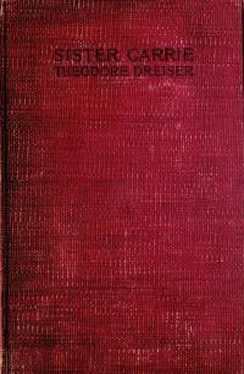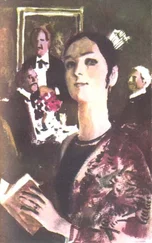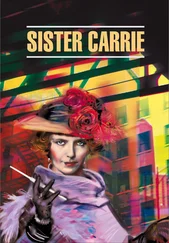Теодор Драйзер - Sister Carrie
Здесь есть возможность читать онлайн «Теодор Драйзер - Sister Carrie» — ознакомительный отрывок электронной книги совершенно бесплатно, а после прочтения отрывка купить полную версию. В некоторых случаях можно слушать аудио, скачать через торрент в формате fb2 и присутствует краткое содержание. Год выпуска: 2004, Жанр: Классическая проза, на английском языке. Описание произведения, (предисловие) а так же отзывы посетителей доступны на портале библиотеки ЛибКат.
- Название:Sister Carrie
- Автор:
- Жанр:
- Год:2004
- ISBN:нет данных
- Рейтинг книги:4 / 5. Голосов: 1
-
Избранное:Добавить в избранное
- Отзывы:
-
Ваша оценка:
- 80
- 1
- 2
- 3
- 4
- 5
Sister Carrie: краткое содержание, описание и аннотация
Предлагаем к чтению аннотацию, описание, краткое содержание или предисловие (зависит от того, что написал сам автор книги «Sister Carrie»). Если вы не нашли необходимую информацию о книге — напишите в комментариях, мы постараемся отыскать её.
Sister Carrie — читать онлайн ознакомительный отрывок
Ниже представлен текст книги, разбитый по страницам. Система сохранения места последней прочитанной страницы, позволяет с удобством читать онлайн бесплатно книгу «Sister Carrie», без необходимости каждый раз заново искать на чём Вы остановились. Поставьте закладку, и сможете в любой момент перейти на страницу, на которой закончили чтение.
Интервал:
Закладка:
She had a chic way of tossing her head to one side, and holding her arms as if for action—not listlessly. In front of the line this showed up even more effectually.
"That girl knows how to carry herself," said the manager, another evening. He began to think that he should like to talk with her. If he hadn't made it a rule to have nothing to do with the members of the chorus, he would have approached her most unbendingly.
"Put that girl at the head of the white column," he suggested to the man in charge of the ballet.
This white column consisted of some twenty girls, all in snow-white flannel trimmed with silver and blue. Its leader was most stunningly arrayed in the same colours, elaborated, however, with epaulets and a belt of silver, with a short sword dangling at one side. Carrie was fitted for this costume, and a few days later appeared, proud of her new laurels. She was especially gratified to find that her salary was now eighteen instead of twelve.
Hurstwood heard nothing about this.
"I'll not give him the rest of my money," said Carrie. "I do enough. I am going to get me something to wear."
As a matter of fact, during this second month she had been buying for herself as recklessly as she dared, regardless of the consequences. There were impending more complications rent day, and more extension of the credit system in the neighbourhood. Now, however, she proposed to do better by herself.
Her first move was to buy a shirt waist, and in studying these she found how little her money would buy—how much, if she could only use all. She forgot that if she were alone she would have to pay for a room and board, and imagined that every cent of her eighteen could be spent for clothes and things that she liked.
At last she picked upon something, which not only used up all her surplus above twelve, but invaded that sum. She knew she was going too far, but her feminine love of finery prevailed. The next day Hurstwood said:
"We owe the grocer five dollars and forty cents this week."
"Do we?" said Carrie, frowning a little.
She looked in her purse to leave it.
"I've only got eight dollars and twenty cents altogether."
"We owe the milkman sixty cents," added Hurstwood.
"Yes, and there's the coal man," said Carrie.
Hurstwood said nothing. He had seen the new things she was buying; the way she was neglecting household duties; the readiness with which she was slipping out afternoons and staying. He felt that something was going to happen. All at once she spoke:
"I don't know," she said; "I can't do it all. I don't earn enough."
This was a direct challenge. Hurstwood had to take it up. He tried to be calm.
"I don't want you to do it all," he said. "I only want a little help until I can get something to do."
"Oh, yes," answered Carrie. "That's always the way. It takes more than I can earn to pay for things. I don't see what I'm going to do."
"Well, I've tried to get something," he exclaimed. "What do you want me to do?"
"You couldn't have tried so very hard," said Carrie. "I got something."
"Well, I did," he said, angered almost to harsh words. "You needn't throw up your success to me. All I asked was a little help until I could get something. I'm not down yet. I'll come up all right."
He tried to speak steadily, but his voice trembled a little.
Carrie's anger melted on the instant. She felt ashamed.
"Well," she said, "here's the money," and emptied it out on the table. "I haven't got quite enough to pay it all. If they can wait until Saturday, though, I'll have some more."
"You keep it," said Hurstwood, sadly. "I only want enough to pay the grocer."
She put it back, and proceeded to get dinner early and in good time. Her little bravado made her feel as if she ought to make amends.
In a little while their old thoughts returned to both.
"She's making more than she says," thought Hurstwood. "She says she's making twelve, but that wouldn't buy all those things. I don't care. Let her keep her money. I'll get something again one of these days. Then she can go to the deuce."
He only said this in his anger, but it prefigured a possible course of action and attitude well enough.
"I don't care," thought Carrie. "He ought to be told to get out and do something. It isn't right that I should support him."
In these days Carrie was introduced to several youths, friends of Miss Osborne, who were of the kind most aptly described as gay and festive. They called once to get Miss Osborne for an afternoon drive. Carrie was with her at the time.
"Come and go along," said Lola.
"No, I can't," said Carrie.
"Oh, yes, come and go. What have you got to do?"
"I have to be home by five," said Carrie.
"What for?"
"Oh, dinner."
"They'll take us to dinner," said Lola.
"Oh, no," said Carrie. "I won't go. I can't."
"Oh, do come. They're awful nice boys. We'll get you back in time. We're only going for a drive in Central Park."
Carrie thought a while, and at last yielded.
"Now, I must be back by half-past four," she said.
The information went in one ear of Lola and out the other.
After Drouet and Hurstwood, there was the least touch of cynicism in her attitude toward young men—especially of the gay and frivolous sort. She felt a little older than they. Some of their pretty compliments seemed silly. Still, she was young in heart and body and youth appealed to her.
"Oh, we'll be right back, Miss Madenda," said one of the chaps, bowing. "You wouldn't think we'd keep you over time, now, would you?"
"Well, I don't know," said Carrie, smiling.
They were off for a drive—she, looking about and noticing fine clothing, the young men voicing those silly pleasantries and weak quips which pass for humour in coy circles. Carrie saw the great park parade of carriages, beginning at the Fifty-ninth Street entrance and winding past the Museum of Art to the exit at One Hundred and Tenth Street and Seventh Avenue. Her eye was once more taken by the show of wealth—the elaborate costumes, elegant harnesses, spirited horses, and, above all, the beauty. Once more the plague of poverty galled her, but now she forgot in a measure her own troubles so far as to forget Hurstwood. He waited until four, five, and even six. It was getting dark when he got up out of his chair.
"I guess she isn't coming home," he said, grimly.
"That's the way," he thought. "She's getting a start now. I'm out of it."
Carrie had really discovered her neglect, but only at a quarter after five, and the open carriage was now far up Seventh Avenue, near the Harlem River.
"What time is it?" she inquired. "I must be getting back."
"A quarter after five," said her companion, consulting an elegant, open-faced watch.
"Oh, dear me!" exclaimed Carrie. Then she settled back with a sigh. "There's no use crying over spilt milk," she said. "It's too late."
"Of course it is," said the youth, who saw visions of a fine dinner now, and such invigorating talk as would result in a reunion after the show. He was greatly taken with Carrie. "We'll drive down to Delmonico's now and have something there, won't we, Orrin?"
"To be sure," replied Orrin, gaily.
Carrie thought of Hurstwood. Never before had she neglected dinner without an excuse.
They drove back, and at 6.15 sat down to dine. It was the Sherry incident over again, the remembrance of which came painfully back to Carrie. She remembered Mrs. Vance, who had never called again after Hurstwood's reception, and Ames.
At this figure her mind halted. It was a strong, clean vision. He liked better books than she read, better people than she associated with. His ideals burned in her heart.
"It's fine to be a good actress," came distinctly back.
What sort of an actress was she?
Читать дальшеИнтервал:
Закладка:
Похожие книги на «Sister Carrie»
Представляем Вашему вниманию похожие книги на «Sister Carrie» списком для выбора. Мы отобрали схожую по названию и смыслу литературу в надежде предоставить читателям больше вариантов отыскать новые, интересные, ещё непрочитанные произведения.
Обсуждение, отзывы о книге «Sister Carrie» и просто собственные мнения читателей. Оставьте ваши комментарии, напишите, что Вы думаете о произведении, его смысле или главных героях. Укажите что конкретно понравилось, а что нет, и почему Вы так считаете.









